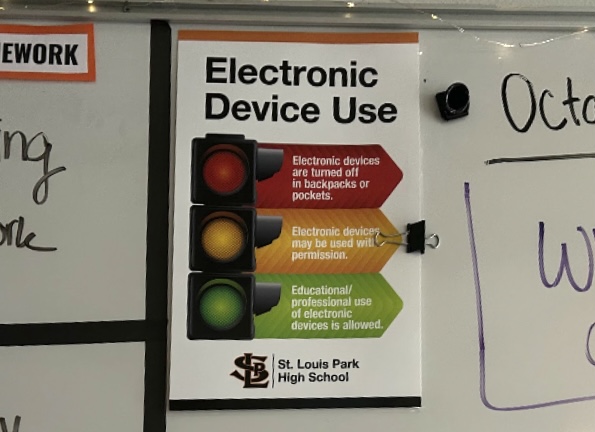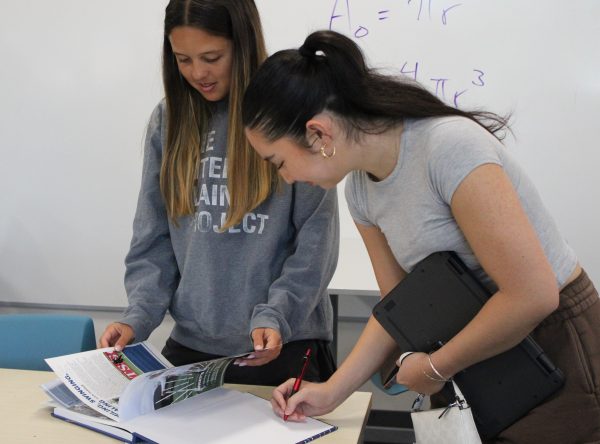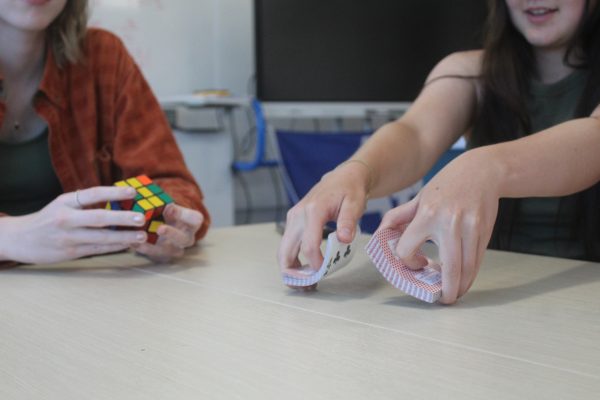Staff Editorial: Cell phone policy brings gloomy reactions
Teachers fail to communicate phone expectations

The Electronic Device Use poster being used Oct. 14 in C371. Showing us we can only use a device with permission.
October 17, 2022
Students are connected to their phones now more than ever and it is beginning to negatively impact their learning. After phones became a consistent distraction for students, the administration took action and put new policies in place regarding phone usage in the classroom. The Echo Editorial Board believes that communication and classroom boundaries may be more beneficial than the current rules.
The Board acknowledges that the new policies have potential, but they’re not effective if they’re not enforced consistently. The Board believes that there have been major inconsistencies and a lack of communication when enforcing the phone policy among students.
Some teachers care a lot about the policies, while others fail to acknowledge them. This leaves students in a world of confusion regarding what is expected of them. Instead of having such strict phone policies as a school, the Board believes that teachers should be able to communicate their own expectations for their classrooms. This will allow for teachers to overcome obstacles by having a space to communicate what works for them.
Although taking phones away may not seem like the best form of punishment, The Board believes that taking phones away from students is beneficial. It is not a fun concept, but it is effective. Teachers should be able to take phones away when they are distracting the class, rather than creating a distraction by taking one away because a student is on their phone by choice. When a student being on their phone is a distraction for the student only, a teacher inserting themselves oftentimes creates a bigger distraction.
It is a student’s responsibility to stay caught up in class and if their phone is in the way of their success in the classroom, it is a student issue. If a student is on their phone in class and failing to retain information, The Board feels it is on students to hold themselves accountable in the classroom.
Park introduced the building-wide classroom policy in an attempt to control the usage of phones during the school day and it came with a lot of varied feelings. Not many teachers have been enforcing it as it is one more task for teachers to think about and it makes highschoolers feel like elementary students. The Board believes that teacher clarification on phone expectations will be more productive than moving a paperclip on a laminated paper.
While phone policies are meant to be productive, they can get in the way of family communication. Some students have medical emergencies and as a community, we are still in the midst of a pandemic. Family emergencies aren’t going to wait for the bell to ring. The Board believes that family communication is crucial to the safety of students. In an attempt to solve this issue, administrators could make an exception for phone usage during emergencies.
The Echo Editorial Board believes no phone problem will ever be fixed unless administrators can be consistent with policies. Currently, the phone policies are ineffective — no matter what teachers say or what policies are put in place, kids are addicted to their phones. Overall, the Echo Editorial Board unanimously agrees that administrators should encourage teachers to consistently communicate their own phone expectations and be consistent in enforcing their policies.











